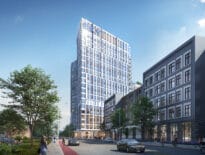With 3,000 units proposed or under development in Everett’s commercial “triangle” district south of Revere Beach Parkway and more to come, readers should be cheering Mayor Carlo DeMaria and other city leaders for setting an example others in Greater Boston should follow.
The relentlessly pro-development DeMaria led an effort to upzone the district – a mix of scrap yards and garages reminiscent of the area’s roots in the rag trade of the 19th and early 20th centuries – some years ago as part of a push to improve the city’s once-seedy reputation.
Now, with major multifamily developers being pushed out of their previous neighborhoods of choice by the booming lab market, the streamlined permitting process for the area and planned public transit investments are luring institutional dollars that might otherwise seek developments further afield.
DeMaria and his allies are admittedly blessed with development sites at a remove from most residents – the state Department of Conservation and Recreation has maintained Revere Beach Parkway so poorly it presents a major obstacle to pedestrians and cuts off the triangle district from the rest of the city.
However, Everett’s experience shows the value of crafting a political consensus that allows permitting decisions about certain types of development in certain places to be depoliticized. By removing the heckler’s veto from the entitlement process, DeMaria is both helping his city and the wider region by providing desperately needed apartments at a rapid clip.
Imagine what municipal leaders who have their eyes open to the housing crisis around them every day could accomplish if they had the intestinal fortitude to lead their communities to support even townhouses, three-deckers or sixplexes by-right within walking distance of their train stations and commercial centers.
But time is of the essence.
Researchers at the UMass Donahue Institute recently calculated that Greater Boston is building new homes at around half the pace it needs to meet the Metro Mayors Coalition’s ambitious but vital goal of building 185,000 new homes in the area within Route 128 by 2030.
And business leaders on Cape Cod finally realized this summer that the region’s decades of underbuilding housing for working families has created a “near-existential crisis” for the region’s economy, with everyone from firefighters to waiters and retail clerks unable to find places to live.
And with the recent heat waves reminding us that climate change is all too real and accelerating, we must begin to reorient our built environments to make as many trips as possible attractive to accomplish on foot, by bicycle or by mass transit.
Fortunately, if the Baker administration writes appropriately demanding regulations to implement the Housing Choice reform’s multifamily zoning mandates, politicians and civic leaders who know what needs to be done will have an effective tool as they try to corral support for density.
Letters to the editor of 300 words or less may be submitted via email at editorial@thewarrengroup.com with the subject line “Letter to the Editor,” or mailed to the offices of The Warren Group. Submission is not a guarantee of publication.





